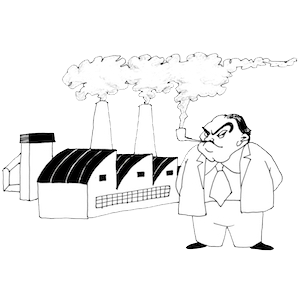The Fuel Light is ON
Issue 005 - 2019-02-11
Lesson: Artificial lack makes us more careful in our spending
The fuel light came on during my school run this morning. I knew I had enough fuel left. But the little glowing light changed the way that I drove. I was more conservative with my acceleration and braking. When I filled up at Manolis' petrol station in Chorafakia, I still had 10 liters left in my tank. That is enough for 57 km with my usual way of driving and 76 km with how I drove today. Yeah, rather don't take out your calculator ;-) Let's just say that it's not a Prius.
In our businesses, we tend to waste less when we have less. This is like Parkinson's Law: "work expands so as to fill the time available for its completion." We can apply Parkinson's Law to money, resources, even coffee. At one company we drank instant coffee from a jar. When we had big jars, we would throw two or three heaped spoons into our cup. They then bought a small jar and refilled that from a hidden larger jar. We all used less coffee. The smaller jar made us more thrifty.
The same goes for most things. We can improve our financial situation by creating artificial lack. Instead of withdrawing $500 at a time, limit it to $200. It will last as long as our $500. Put money in bank accounts that are harder to access. Every barrier that we add to make it a bit more difficult to spend, means we have more left at the end of the month.
One of these barriers is our $100 rule, which I describe in my course "Entrepreneurially" (free preview). The principle is easy. My wife and I agreed to not spontaneously buy anything that cost more than $100. We would always go home and then come back the next day. Let's say we saw a nice pair of Oakley's sunglasses for $150. In the past, we would stick them on our credit card and take them home with us immediately. But we have created an artificial barrier to stop that. Our $100 rule makes us go home and sleep on it. When we are away from the cool sunglasses, we realize that even though Oakley make fine sunglasses, $150 is a lot of money. We could pick up a $30 pair of sunglasses that will last just as long and do the same job. It can also go the other way. The $150 glasses might be made of plastic, meaning we have to replace them after three years. Glass might cost $250, but last for 10 years, if we don't lose them. So we might spend more money, but with better forethought.
Thanks for reading and I hope you have learned even one little thing :-)
Kind regards from your friendly entrepreneur
Heinz
Living Entrepreneurially Archive
- 012 - Crashproof Your Business
- 011 - "Was weg ist, ist weg"
- 010 - Fear of Rejection
- 009 - Quality, Reliability, Be Nice
- 008 - Be Prepared
- 007 - Riding School
- 006 - Inner Dynamo
- 005 - The Fuel Light is ON
- 004 - "I filled it in exactly as your father did"
- 003 - The Espresso Machine Guy
- 002 - "Escape is Giving Me Bad Dreams"
- 001 - The Cleaning Fluid Injection Device
Entrepreneurially Course
 For those who want to change their perspective on life, to attain true freedom and take control of their own destiny
more...
For those who want to change their perspective on life, to attain true freedom and take control of their own destiny
more...